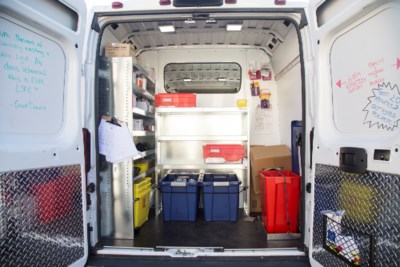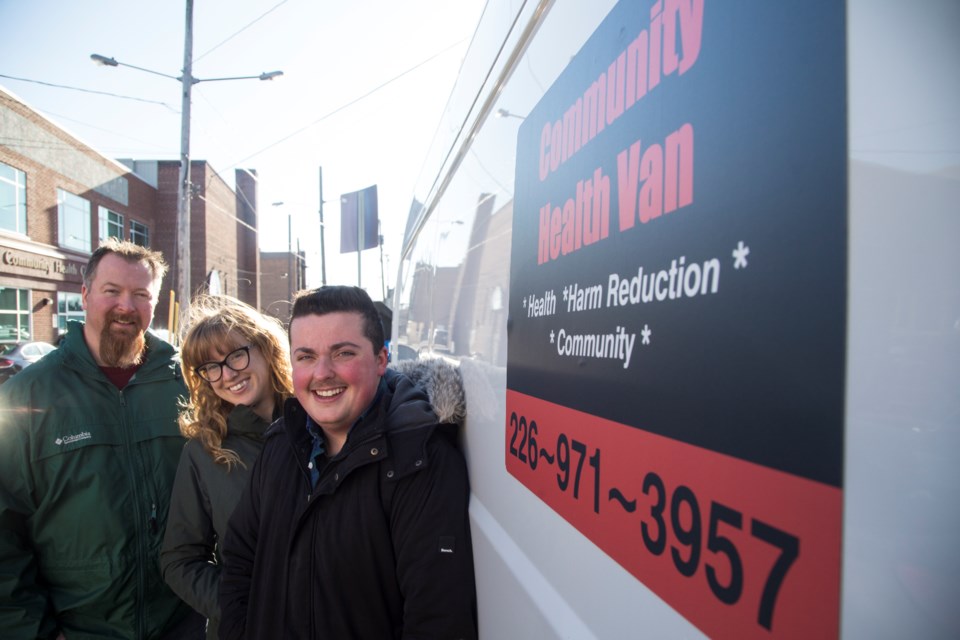Harm reduction is about more than giving free needles and pipes to people who use illicit drugs, says Sanguen Health Centre program director Colin McVicker.
The idea behind harm reduction is to offer people resources to allow them to use them in the safest ways possible.
McVicker said harm reduction work saves taxpayer dollars by diverting people from the hospital's emergency department.
“If people don’t care about drugs and they don’t care about mental health and they don’t care about poverty — if they do care about how much they pay in taxes, they should be caring about harm reduction,” said McVicker.
The team at Sanguen has seen some early successes over the last two months with a Mobile Health Van pilot project.
The centre operates the van in partnership with ARCH and Wellington-Dufferin-Guelph Public Health.
The concept of the van is simple, roll up to areas where you find the people who need the services help them.
“We can actually get people to the services they need sooner than later, ultimately saving the taxpayer dollars,” said McVicker.
Every Thursday evening, the Mobile Health Van travels to various downtown Guelph locations where vulnerable people gather, like Wyndham House, Royal City Church and Carden St.
The van offers health services at a fraction of the cost of a traditional clinic, said McVicker.
“If we help our most marginalized, we will have a healthier community because it’s costing us less, more people are getting the services we need and we are reducing some of the social consequences,” said McVicker.
Karen Lomax is a peer support with Sanguen and one of the five workers on the van.
Lomax said there are many barriers preventing vulnerable people from accessing health services in a traditional clinic setting.
“When you’re a vulnerable person, a nine o’clock appointment is not the top priority — it’s where are you going to sleep tonight, are you going to be warm enough throughout the night,” said Lomax.
The van concept solves that problem by taking the services to the client.
Alice Maguire, support coordinator for Sanguen, said the van offers many health services, and can help divert people from hospital by treating infections, rashes and needle stick injuries on the spot.
As important as treating injuries, said Maguire, is building trust and creating meaningful relationships with their clients.
"We know that relationships are the cornerstone of harm reduction," said Maguire.
The team also offers harm reduction kits and naloxone, as well as basic hygiene needs, food, water and basic clothing.
A harm reduction kit will include new needles or a clean pipe, depending on what drug is to being used.
With winter weather upon us, the team is handing out hats, mittens, gloves and other winter apparel they receive by donation.
“We will need a steady supply of those from now until (spring),” said Maguire.
For many who use it, said McVicker, the van is the most accessible service they come in contact with.
“Some people think that people come to the van because of the harm reduction supplies, but people are also coming to the van for hot chocolate, for the warm gear, the conversation. It’s not the needle van, it’s not the harm reduction supply van, it’s the community health van,” he said.
The team also collects medical waste, said Rene Peltekian, mobile outreach coordinator for Sanguen and driver of the van.
In just two months of operation the team has collected 700 used syringes.
Besides harm reduction kits, the team has handed out 77 kits of naloxone — a drug which can counteract the effects of an opioid overdose.
“People are coming one week to get the naloxone kits, then next week they are getting a refill because they have used it. This just shows the high need and how serious the opioid crisis is that people are needing this,” said Peltekian.
McVicker said opioids like fentanyl are making it dangerous to use just about any illicit drug, making harm reduction that much more important.
“Fentynol is a game changer right now, because anything that touches a scale can potentially have fentanyl in it,” said McVicker.
Tracy Hobson, hepatitis C treatment nurse with Sanguen Health Centre is also a team member who works on the van.
One concern Hobson hears from the public is the idea that giving a needle to a user of illicit drugs is enabling them to continue to use.
“They are going to use whether I give them a needle or not — so I would rather they use with a clean needle, one that hasn’t been used six times and is dull and doing more damage to their veins,” said Hobson.
 Harm reduction supplies in the back of the Mobile Health Van. The van is intended to support those who experience a high degree of marginalization as a result of chronic homelessness, addictions and mental health. Kenneth Armstrong/GuelphToday
Harm reduction supplies in the back of the Mobile Health Van. The van is intended to support those who experience a high degree of marginalization as a result of chronic homelessness, addictions and mental health. Kenneth Armstrong/GuelphTodayLomax said people who use illicit drugs don’t tend to go to the emergency department.
“It’s the last resort. The stigma is quite high or they have had bad experiences. They are not going there unless it’s a life or death situation, so people will opt out of going to see anybody. If they don’t have a doctor, they are just not going to get seen,” said Lomax.
Hobson said it is rewarding to be working in her role as a hepatitis C treatment nurse in the field, not only in an office.
It also allows her to assess people who otherwise might not see a medical professional until it’s too late.
“It’s cool to actually get out there and actually be seeing people, getting to connect with people that usually wouldn’t get to see us. I can have a conversation about what they have been tested for and ask if they need vaccinations,” said Hobson.
The project is currently funded by a grant from the Ontario Trillium Foundation and through private donations.
Recently, St. James Catholic High School students raised over $1,000 for the van through a $2 dress down day.
“I never thought we would be on their radar, out of all the great causes out there to be able to donate to, they saw us as one they wanted to contribute to,” said McVicker.
Various corporations have been donating food, toiletries and other items for the team to hand out.
“We have a very generous community — we know that and we’re grateful for that,” said McVicker.
In mid January, the team plans on adding a second night to service outlying areas of Guelph. A third evening is planned to service rural Wellington County.
“We know we can do more. We are excited to do more, we are just trying to find dollars to provide more to the community,” said McVicker.
